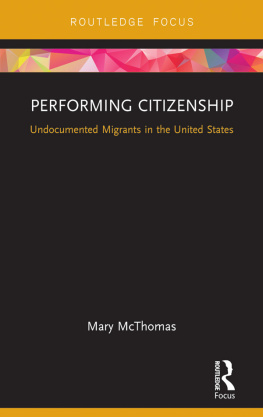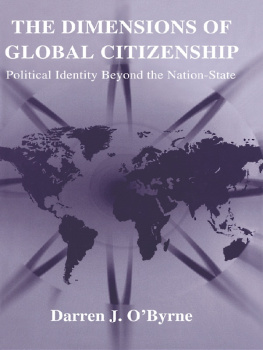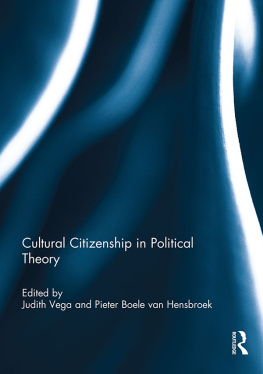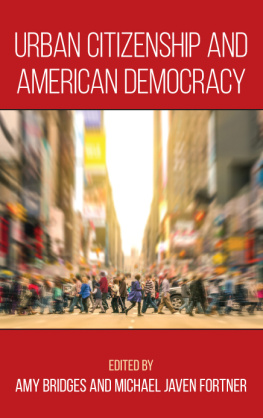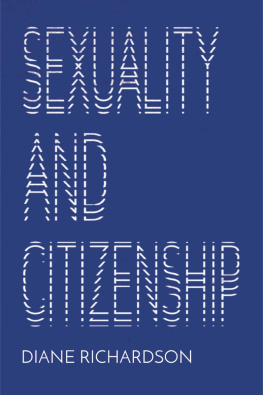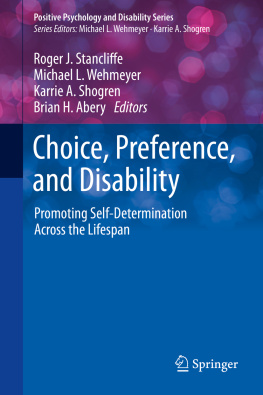Citizenship Inclusion and Intellectual Disability
Making no humanist friends, Altermarks outstanding book disseminates the very ideals of citizenship that are peddled in the name of social inclusion but are revealed to be of the most pernicious kinds of thought that render people with intellectual disabilities surplus to requirements. Read this. Read it now.
Daniel Goodley, Director of Research, The Universtiy of Sheffield
What happens when a group traditionally defined as lacking the necessary capacities of citizenship is targeted by government programs that have made citizenship inclusion their main goal? Combining theoretical perspectives of political philosophy, social theory, and disability studies, this book untangles the current state of Western intellectual disability politics following the replacement of state institutionalisation by independent and supported living, individual rights, and self-determination.
Taking its cue from Foucaults conception of biopolitics, denoting the government of the individuals and the totality of the population, its overarching argument is that the ambiguous positioning of people with intellectual disabilities with respect to the ideals of citizenship results in a regime of government that simultaneously includes and excludes people of this group. On the one hand, its members are projected to become ideal-citizens via the cultivation of citizenship capacities. On the other, the right to live independently and by their own choices is curtailed as soon as they are seen as failing with respect to the ideals of reason and rationality. Therefore, coercion, restraints, and paternalism, which were all supposed to end with deinstitutionalisation, are still ingrained in services targeting the group.
In equal parts a theoretical work, advancing debates of critical disability theory, social theory, and post-structural philosophy, as well as an empirical engagement with the history of intellectual disability politics and the ways in which present day politics target the group, this book will be of interest to all students and scholars of disability studies, disability politics, and political theory.
Niklas Altermark is a researcher at the Department of Political Science at Lund University. His work focuses on ideas revolving around vulnerability, as a grounds for exclusion but also as a resource of critical theory, in order to understand the historical and present government of groups that are judged to be deviating. Alter-marks articles have for example appeared in Disability & Society, Pedagogy, Culture & Society, International Political Sociology, and Review of Disability Studies An International Journal. Lately, he has been engaged in the Swedish struggle against austerity measures striking down on people with disabilities, chronic illnesses, and mental health conditions.
Routledge Advances in Disability Studies
www.routledge.com/Routledge-Advances-in-Disability-Studies/book-series/RADS
Disability, Avoidance and the Academy
Challenging Resistance
Edited by David Bolt and Claire Penketh
Autism in a De-centered World
Alice Wexler
Disabled Childhoods
Monitoring Differences and Emerging Identities
Janice McLaughlin, Edmund Coleman-Fountain and Emma Clavering
Intellectual Disability and Being Human
A Care Ethics Model
Chrissie Rogers
The Changing Disability Policy System
Active Citizenship and Disability in Europe Volume 1
Edited by Rune Halvorsen, Bjrn Hvinden, Jerome Bickenbach, Delia Ferri and Ana Marta Guilln Rodriguez
Intellectual Disability and the Right to a Sexual Life
A Continuation of the Autonomy/Paternalism Debate
Simon Foley
Citizenship Inclusion and Intellectual Disability
Biopolitics Post-Institutionalisation
Niklas Altermark
Not yet published:
The Changing Disability Policy System
Active Citizenship and Disability in Europe Volume 2
Edited by Rune Halvorsen, Bjrn Hvinden, Jerome Bickenbach, Delia Ferri and Ana Marta Guilln Rodriguez
First published 2018
by Routledge
2 Park Square, Milton Park, Abingdon, Oxon OX14 4RN
and by Routledge
711 Third Avenue, New York, NY 10017
Routledge is an imprint of the Taylor & Francis Group, an informa business
2018 Niklas Altermark
The right of Niklas Altermark to be identified as author of this work has been asserted by him in accordance with sections 77 and 78 of the Copyright, Designs and Patents Act 1988.
All rights reserved. No part of this book may be reprinted or reproduced or utilised in any form or by any electronic, mechanical, or other means, now known or hereafter invented, including photocopying and recording, or in any information storage or retrieval system, without permission in writing from the publishers.
Trademark notice: Product or corporate names may be trademarks or registered trademarks, and are used only for identification and explanation without intent to infringe.
British Library Cataloguing-in-Publication Data
A catalogue record for this book is available from the British Library
Library of Congress Cataloging-in-Publication Data
Names: Altermark, Niklas, author.
Title: Citizenship inclusion and intellectual disability : biopolitics post-
institutionalisation / Niklas Altermark.
Description: Abingdon, Oxon ; NewYork, NY : Routledge, [2018] | Series:
Routledge advances in disability studies | Includes bibliographical
references and index.
Identifiers: LCCN 2017027239 | ISBN 9781138088313 (hardback) |
ISBN 9781315109947 (ebook)
Subjects: LCSH: People with mental disabilitiesGovernment policy. |
People with mental disabilitiesCivil rights. | Citizenship. | Social
integration. | Biopolitics. | Sociology of disabilityPolitical aspects.
Classification: LCC HV3004 .A55 2018 | DDC 323.6087/4dc23
LC record available at https://lccn.loc.gov/2017027239
ISBN: 978-1-138-08831-3 (hbk)
ISBN: 978-1-315-10994-7 (ebk)
Typeset in Times New Roman
by Apex CoVantage, LLC
The process of writing this book has been less lonely than I figured beforehand. To a large extent, this is certainly so since it was written in a truly stimulating intellectual environment: the Department of Political Science at Lund University. Thanks to all of you!
I want to single out a handful of people that have been of special importance. First Ylva Stubbergaard and Anders Uhlin, who provided me with good advice and encouragement at crucial stages in the process of writing. My friend and intellectual partner in crime, Linda Nyberg: I am sincerely grateful to have someone like you in my life. I also got great comments and criticisms at various stages of the writing process; Jens Bartelson, Jens Rydstrm, Ted Svensson, Sara Kalm, Ivan Gusic, Mirjam Katzin, Rickard Andersson, Ulrika Waaranper, Martin Ericsson, Catarina Kinnvall and Emil Edenborg, thank you!
Outside of Lund University, I have been stimulated and inspired by Susanne Berg, Caroline Hammar, Vilhelm Ekensteen, Cecilia Ekholm, Christine Bylund, Vanja K. Carlsson, Julia Bahner, and the activists of Grunden, among others. I also want to thank Dan Goodley for a stimulating conversation about the arguments presented in this book. The end product has most certainly benefitted hugely from that discussion! Petra Bjrne, although we may disagree about many of the arguments presented in the pages that follow, your combination of smartness and courage have taught me so much; thank you for challenging me.


